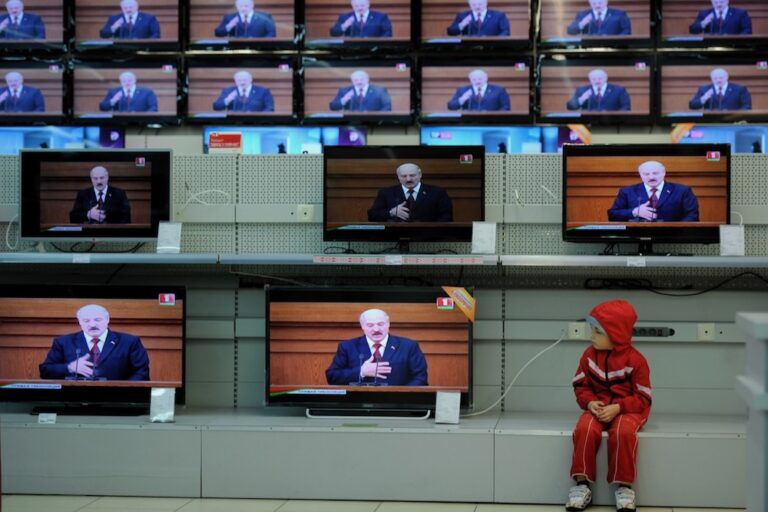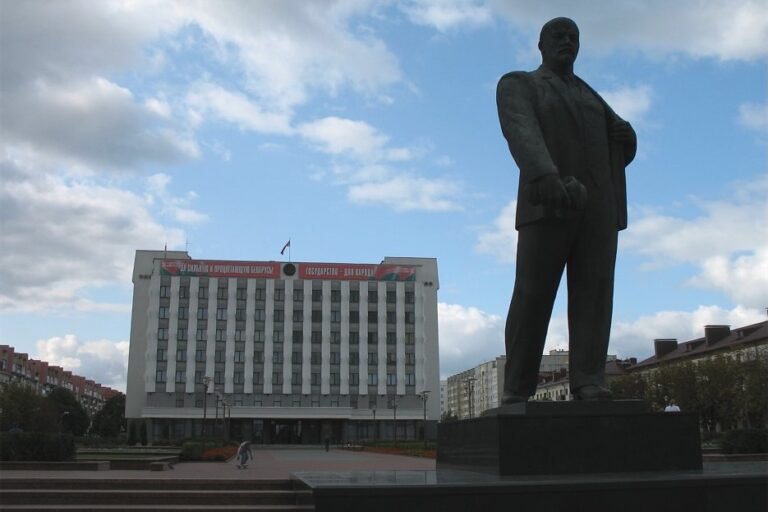(IPA/Norwegian PEN/IFEX) – The following is a joint 10 December 2007 IPA/Norwegian PEN press release: Launch of First joint IPA-Norwegian PEN Report “Freedom of Expression in Belarus” Geneva, Oslo, 10. December 2007 In its first joint report on freedom of expression conditions in Belarus, the International Publishers Association (IPA) and Norwegian PEN conclude that it […]
(IPA/Norwegian PEN/IFEX) – The following is a joint 10 December 2007 IPA/Norwegian PEN press release:
Launch of First joint IPA-Norwegian PEN Report
“Freedom of Expression in Belarus”
Geneva, Oslo, 10. December 2007
In its first joint report on freedom of expression conditions in Belarus, the International Publishers Association (IPA) and Norwegian PEN conclude that it is getting more and more important that freedom of expressions organisations, as well as the international community at large, in particular European institutions, increasingly monitor developments in Belarus.
“Freedom of Expression in Belarus” is a report based on a recent joint IPA-PEN Norway fact-finding mission to Belarus. The fact-finding mission took place in Minsk and Hrodna (300 kilometres west of Minsk) on 14-18 November 2007. The report is being launched worldwide on 10 December 2007 in Oslo and Geneva.
Carl Morten Iversen, Secretary General of Norwegian PEN, declares: “It is the second time in three years that Norwegian PEN is leading a fact-finding mission to Belarus, this time jointly with the International Publishers Association and the Norwegian Union of Journalists. The lack of positive change has led us to conclude that the Belarusian authorities at the initiative of President Lukashenko have sought to further stifle freedom of expression in the country”.
Alexis Krikorian, Director FTP of IPA, adds: “We call on the EU to not engage in the European Neighbourhood policy with Belarus until this country has made progress in the field of freedom of expression and freedom to publish”.
In their joint report, IPA and Norwegian PEN have addressed the following recommendations to the Belarusian authorities:
– Repeal all criminal defamation laws, in particular Articles 367, 368 & 369 of the Belarusian Penal Code;
– Stop imposing prison sentences and disproportionate fines in defamation cases;
– Degrade Articles 188 and 189 from the Penal Code to the Civil Code so as to ease the chilling effect on freedom of expression;
– Repeal Article 10 of the Media Law, in particular the section requiring news media to register with the local authorities where their premises are located;
– Open spaces for public debates before pushing through legislative changes having a chilling effect on freedom of expression (e.g.: Proposed Law on Information, Informatization, and the Protection of Information);
– In general bring Belarusian media laws in line with international standards;
– Free Andrei Klimov from prison (see *appendix about his case)
– Lift the obligation to take an oral exam to get a book publishing license;
– Lift the book publishing license system;
– Free the book distribution system;
– Stop using the distribution system as a way to hamper the distribution of independent newspapers (retail & subscription);
– In general refrain from discriminatory policies towards independent media;
– Stop repressing all forms of expression in the Belarusian language;
– If the proposed law on Information, Informatization, and the Protection of Information goes through, do not make the registration of online publications compulsory.
The report is available on-line:
Norwegian PEN: http://www.norskpen.no
IPA: http://www.internationalpublishers.org
*Writer and political activist Andrei Klimov was arrested on 3 April 2007 following the posting of a publication of his on the web site of the United Civil Party and that criticized the regime of Alexander Lukashenko.
On 1 August 2007, Minsk’s Central District Court sentenced Andrei Klimov to two years in a high-security prison for making public calls to overthrow the government or to change the constitutional order violently using the media (Art. 361 BPC). At the end of a closed-door trial, Klimov was sentenced to two years in a high-security prison.


